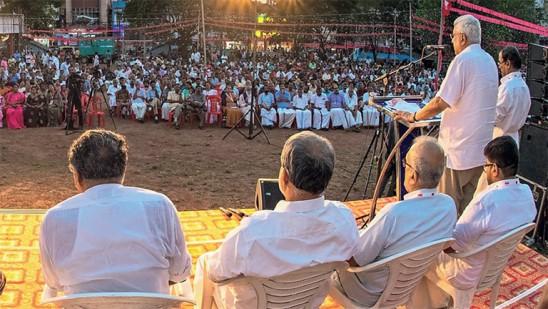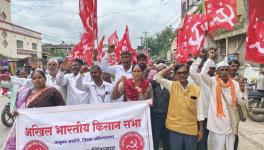To Revive Agriculture, AIKS Demands Land Reforms, MSP and no Corporate Intervention

CPI(M) Polit Bureau member Prakash Karat inaugurated the national seminar held during the 35th national conference of the AIKS in Kerala. (Courtesy: Deshabhimani)
Thrissur: The agrarian crisis, the way out and alternatives formed the crux of a national seminar and commissions held as part of the 35th all India conference of the All India Kisan Sabha (AIKS). The conference deliberated in detail on the desperation of corporate capital in capturing the agricultural sector, a relatively unconquered section of the economy.
The need for land reforms, minimum support price (MSP) and strengthening of the cooperative systems to save agriculture and farmers also featured in the conference which began on December 13 in Thrissur, Kerala.
A national seminar held in connection with the conference called for the sustained unity of the workers, farmers and agricultural labourers to defeat the “authoritarian regime led by the Rashtriya Swayamsevak Sangh (RSS)-backed Bharatiya Janata Party (BJP).”
While the inordinate delay in assured and remunerative prices for farm produce is leading to huge losses for the farmers, they face the daunting task of arresting the role of corporate capital in the chain of inputs, marketing and procurement to protect the sector itself, the conference opined.
‘CORPORATE CAPITAL IN CONFLICT WITH PEASANTRY’
Recent years have seen massive and sustained struggles from farmers across the country including Maharashtra, Rajasthan and Himachal Pradesh. The AIKS defined the massive farmer's protest in Delhi as the culmination of such struggles and not a knee-jerk action.
The farm laws which were withdrawn after the historic struggle had aimed at stopping corporatisation of the agricultural sector.
Surajit Majumdar, professor of economics at Jawaharlal Nehru University (JNU), Delhi, explained the reasons for increased interest of corporate capital in agriculture in recent years. “The corporate capture of other sectors of the economy has progressed very far and the scope for further expansion is limited. The aim now is to capture the sectors not under corporate capital and that's why the agricultural sector has become important for such forces," he told NewsClick.
The conference discussed in detail the conflict and the proposed alternatives to save the peasantry from further crisis.
“The most important thing would be to reduce corporate control in the different areas of agriculture, including inputs and machinery. Another factor is to explore the possibility of building cooperative sectors," Mazumdar said.
‘IMPLEMENT LAND REFORMS’
Land reforms, a key instrument for the development of society, have been implemented only in a few states across the country. Kerala, under the leadership of E M S Namboodiripad as chief minister in 1957, spearheaded the land reform movement.
V K Ramachandran, Vice Chairman of the Kerala State Planning Board, attributed the development of the state to the land reforms carried out seven decades back. “The advancement made by the state in education, agriculture, social justice and gender equality are all results of the reforms. These are completely intertwined," he told NewsClick.
Other states like West Bengal, Tripura and Jammu & Kashmir have implemented land reforms.
‘Emerging Issues in Land Policy in Rural India’, a commission held during the conference stressed the need to intensify the class-based struggles for land.
The commission also demanded the state governments immediately take possession of all remaining ceiling surplus lands and distribute all land that has already been taken possession of.
MSP IS CRUCIAL
Though the farmers were protesting against the three farm laws, the assurance of MSP was a major demand of the kisan organisations. The recommendations of the Jha committee and the M S Swaminathan Commission have recommended MSP, which the governments have failed to implement.
Vikas Rawal, a professor at JNU, explained the sorry state of farmers in deciding on the crop they harvest and the returns they could get. "The uncertainty about the prices impact choices of crops and farm investments lead to farm losses and low income. Only a guaranteed price and procurement will ensure stability in the sector," he told NewsClick.
Though the BJP had promised to implement the Swaminathan Commission recommendations during the Lok Sabha election campaign in 2014, the recent policy moves have put more stress on the farmers.
"An increased role of the government in subsidising inputs and assuring procurement in the long run and loan waiver as a short-term solution is required," Vikas Rawal said.
“CRISIS DEEPENED AFTER NEOLIBERAL POLICIES”
A national seminar held on December 15, emphasised the need for unity of the workers and farmers. The trade unions and kisan organisation have held several joint struggles against the pro-corporate policies of the BJP regime since 2014.
"It is important to carry forward the worker-peasant unity into an alliance which would be a class alliance to defeat the present BJP government. Such an alliance will also serve as the bedrock for an alternative,” said Prakash Karat, polit bureau member of the Communist Party of India (Marxist) [CPI(M)], while inaugurating the seminar.
While noted economist Prabhat Patnaik equated the ongoing crisis with the crisis which led to famines during the colonial period, professor Jagmohan Singh called for unified struggles of pre-independence to win the rights of the farmers.
"Any attempts to revive the agriculture sector will not be complete without the complete withdrawal of the neoliberal policies and ensuring the bringing back of subsidies to farmers,” Patnaik said.
In the run-up to the national conference, the AIKS held 18 seminars across Thrissur district from November 24 to December 8, including topics on Cooperative Models in Kerala, Science and Technology for Agriculture Development, Crisis in Indian Agriculture and Achievements of Kerala in the agriculture sector.
Get the latest reports & analysis with people's perspective on Protests, movements & deep analytical videos, discussions of the current affairs in your Telegram app. Subscribe to NewsClick's Telegram channel & get Real-Time updates on stories, as they get published on our website.
























